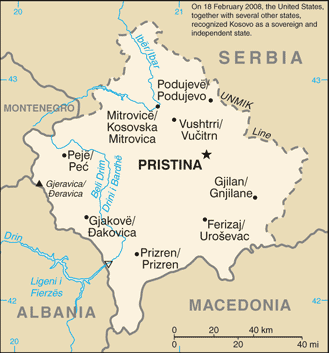In a non-binding ruling, the UN’s International Court of Justice ruled that the 2008 “secession” of Kosovo from Serbia didn’t violate any laws, though the minority opinion from the court insisted that the UN-backed Kosovo government did not have the authority to make such a move.
 The court seemed to be making an effort to make the ruling as broad (or perhaps vague) as possible, insisting that there was nothing in international law that could be interpreted as a “prohibition of declarations of independence.”
The court seemed to be making an effort to make the ruling as broad (or perhaps vague) as possible, insisting that there was nothing in international law that could be interpreted as a “prohibition of declarations of independence.”
But while the eyes of everyone in Kosovo and Serbia were on this ruling, the impact could be even more broadly felt across the world, as a number of other secessionist movements could cite the ruling in their own defense.
Edwin Bakker of the Clingendael Netherlands Institute of International Relations termed the ruling “bad news to a number of governments dealing with separatist movements,” adding that it could damage the long-standing assumption that territorial integrity of current nations should be maintained in all situations.
Secessionist movements in Spain, in Kashmir, in Kurdistan, and indeed in Kosovo itself, where a Serbian enclave seeks separation from the new NATO-backed government, could be effected. So too could a number of other movements the world over.
But perhaps the biggest winners will be South Ossetia and Abkhazia, as nations which use this ruling as justification for recognizing Kosovo would have serious difficulty explaining how those two republics, which also seceded in 2008 after the Russo-Georgia War, are in any way a different case, except that it was Russia, not NATO, which guaranteed their separation from their former suzerain power, after a messy clash.


